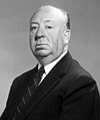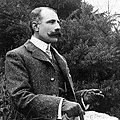The England portal

| |
England is a country that is part of the United Kingdom. It is located on the island of Great Britain, of which it covers approximately 62%, and over 100 smaller adjacent islands. It has land borders with Scotland to the north and Wales to the west, and is otherwise surrounded by the North Sea to the east, the English Channel to the south, the Celtic Sea to the south-west, and the Irish Sea to the west. Continental Europe lies to the south-east, and Ireland to the west. At the 2021 census, the population was 56,490,048. London is both the largest city and the capital.
The area now called England was first inhabited by modern humans during the Upper Paleolithic. It takes its name from the Angles, a Germanic tribe who settled during the 5th and 6th centuries. England became a unified state in the 10th century and has had a significant cultural and legal impact on the wider world since the Age of Discovery, which began during the 15th century. The Kingdom of England, which included Wales after 1535, ceased to be a separate sovereign state on 1 May 1707, when the Acts of Union brought into effect a political union with the Kingdom of Scotland that created the Kingdom of Great Britain.
England is the origin of the English language, the English legal system (which served as the basis for the common law systems of many other countries), association football, and the Anglican branch of Christianity; its parliamentary system of government has been widely adopted by other nations. The Industrial Revolution began in 18th-century England, transforming its society into the world's first industrialised nation. England is home to the two oldest universities in the English-speaking world: the University of Oxford, founded in 1096, and the University of Cambridge, founded in 1209. Both universities are ranked among the most prestigious in the world.
England's terrain chiefly consists of low hills and plains, especially in the centre and south. Upland and mountainous terrain is mostly found in the north and west, including Dartmoor, the Lake District, the Pennines, and the Shropshire Hills. The country's capital is London, the metropolitan area of which has a population of 14.2 million as of 2021, representing the United Kingdom's largest metropolitan area. England's population of 56.3 million comprises 84% of the population of the United Kingdom, largely concentrated around London, the South East, and conurbations in the Midlands, the North West, the North East, and Yorkshire, which each developed as major industrial regions during the 19th century. (Full article...)

William Shakespeare (c. 23 April 1564 – 23 April 1616) was an English playwright, poet and actor. He is widely regarded as the greatest writer in the English language and the world's pre-eminent dramatist. He is often called England's national poet and the "Bard of Avon" (or simply "the Bard"). His extant works, including collaborations, consist of some 39 plays, 154 sonnets, three long narrative poems and a few other verses, some of uncertain authorship. His plays have been translated into every major living language and are performed more often than those of any other playwright. Shakespeare remains arguably the most influential writer in the English language, and his works continue to be studied and reinterpreted.
Shakespeare was born and raised in Stratford-upon-Avon, Warwickshire. At the age of 18, he married Anne Hathaway, with whom he had three children: Susanna, and twins Hamnet and Judith. Sometime between 1585 and 1592, he began a successful career in London as an actor, writer, and part-owner ("sharer") of a playing company called the Lord Chamberlain's Men, later known as the King's Men after the ascension of King James VI of Scotland to the English throne. At age 49 (around 1613), he appears to have retired to Stratford, where he died three years later. Few records of Shakespeare's private life survive; this has stimulated considerable speculation about such matters as his physical appearance, his sexuality, his religious beliefs and even certain fringe theories as to whether the works attributed to him were written by others. (Full article...)Selected article -
General images
In July 1385 Richard II, king of England, led an English army into Scotland. The invasion was, in part, retaliation for Scottish border raids, but was most provoked by the arrival of a French army into Scotland the previous summer. England and France were engaged in the Hundred Years' War, and France and Scotland had a treaty to support each other. The English King had only recently come of age, and it was expected that he would play a martial role just as his father, Edward the Black Prince, and grandfather Edward III had done. There was some disagreement amongst the English leadership whether to invade France or Scotland; the King's uncle, John of Gaunt, favoured invading France, to gain him a tactical advantage in Castile, the throne of which he claimed through his wife, Constance, with little success. The King's friends among the nobility – who were also Gaunt's enemies – preferred an invasion of Scotland. A parliament the year before had granted funds for a continental campaign and it was deemed unwise to flout the House of Commons. The Crown could barely afford a big campaign. Richard summoned the feudal levy, which had not been called for many years; this was the last occasion on which it was to be summoned.
Richard promulgated ordinances to maintain discipline in his invasion force, but the campaign was beset by problems from the start. One of Richard's knights was killed by the king's half-brother before the army even reached Newcastle; once there, the leadership was divided and often indulged more in internecine fighting than in fighting against the Scots, who, with their French allies, had retired in the face of the English and refused battle. The Scots scorched the earth as they retired. The invaders swiftly exhausted their food and other supplies; by the time the English reached Edinburgh, they had achieved little of military value, mostly the burning of churches. Gaunt may have proposed chasing the Scots into the mountains to force them to battle, but the King refused to countenance such a tactic and the army soon withdrew to England. As Richard's force left Scotland, the Franco-Scottish army counter-invaded England from the West March getting almost as far as Carlisle and ravaged Cumbria and Durham on its return. Richard was to propose another invasion of Scotland a few years later, but this came to nothing; and on his next invasion, of Ireland in 1399, he was deposed by Gaunt's son, Henry Bolingbroke. (Full article...)Did you know?

- ... that the 1643 Westminster Assembly, which was appointed by the Parliament of England to restructure the Church of England, produced the Westminster Confession, the foundation of the Presbyterian Church?
- ... that Declaration of Sports was a 1617 declaration of James I of England listing archery and dancing as permissible on Sundays and that Puritans in Parliament had it publicly burned in 1643?
- ... that Jemmy Button was a Yaghan from Tierra del Fuego who was bought for a mother-of-pearl button in 1830 and taken on HMS Beagle to meet the King and Queen of England?
In the news

- 13 September 2024 –
- Bedfordshire Police arrest an 18-year-old man on suspicion of murder after three people are found dead in a tower block in Luton, England, United Kingdom. (BBC News)
- 10 September 2024 –
- His Majesty's Prison Service begins releasing thousands of prisoners in England and Wales early amid a record high prison population and a shortage of prison cells for new inmates. (BBC News)
- 10 September 2024 – 2021–present United Kingdom cost-of-living crisis
- The House of Commons of the United Kingdom votes 348–228 to end the Winter Fuel Payment for 10 million pensioners in England and Wales after Prime Minister Keir Starmer warned that the scheme was no longer affordable to be applied universally. (Sky News)
- 21 August 2024 – 2023–2024 mpox epidemic
- Several suspected cases of mpox clade 1b are reported in Somerset, England, United Kingdom. (Devon Live)
- 21 August 2024 –
- Four people, including three children, are killed in a house fire in Bradford, England, United Kingdom. Police say that the fire was started deliberately and that a suspect has been arrested under suspicion of murder. (BBC News)
Selected featured content
Categories
Selected quotes
| “ | An Englishman, even if he is alone, forms an orderly queue of one. | ” |
Related WikiProjects
England • Bedfordshire • Brighton • Cheshire • Cornwall • Derbyshire • Dorset • Greater Manchester • Hampshire • Lincolnshire • London • Merseyside • Northamptonshire • North East England • Sheffield • Surrey. Warwickshire • West Midlands • Worcestershire • Yorkshire
Topics
Things you can do

- Please visit the English Wikipedians' notice board and help to write new England-related articles, and expand and improve existing ones.
- Visit Wikipedia:WikiProject England/Assessment, and help out by assessing unrated English articles.
- Add the Project Banner to English articles around Wikipedia.
- Check for announcements and open tasks for ways to improve English related articles.
- Help nominate and select new content for the England portal.
- Requested articles: Charterhouse Lane • Renewable energy in England • Ealing Village
- Expand: Dorothy Boyd • David Troughton
Related Portals
 |
 |
 |
 |
 |
 |
 |
 |
| East Midlands | London | North East | North West | South East | South West | West Midlands | Yorkshire and the Humber |

|

|

|

|

|
| Ireland | Northern Ireland | Scotland | United Kingdom | Wales |
Associated Wikimedia
The following Wikimedia Foundation sister projects provide more on this subject:
-
Commons
Free media repository -
Wikibooks
Free textbooks and manuals -
Wikidata
Free knowledge base -
Wikinews
Free-content news -
Wikiquote
Collection of quotations -
Wikisource
Free-content library -
Wikiversity
Free learning tools -
Wikivoyage
Free travel guide -
Wiktionary
Dictionary and thesaurus






























































![Image 62The Staffordshire Hoard is the largest hoard of Anglo-Saxon gold and silver metalwork yet found[update]. It consists of almost 4,600 items and metal fragments. (from Culture of England)](http://upload.wikimedia.org/wikipedia/commons/thumb/6/60/Staffordshire_hoard_annotated.jpg/120px-Staffordshire_hoard_annotated.jpg)





































